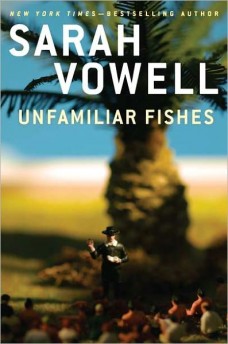 Reviewed:
Reviewed:
Unfamiliar Fishes by Sarah Vowell
Riverhead Books, 256 pages, $25.95
If the Hawaiian word haole, as Sarah Vowell explains in her new history of the archipelago, Unfamiliar Fishes, means something like ‘pasty-faced foreigner,’ then Vowell herself is the haole of haoles. She doesn’t swim, let alone surf, and she’s better known for poking around dimly lit archives than for sipping cocktails in a hula skirt. Why, then, has she turned her attention to a tropical paradise? To do us a favor, it turns out, by dismantling exactly that cliched vision of Hawaii that many of us still hold.
Unfamiliar Fishes relates the little-told saga of the Americanization of Hawaii, from the downfall of the great King Kamehameha in 1820 to the islands’ annexation to the United States in 1898 — a victory for the descendants of missionaries and sailors who had taken over Hawaiian government, and a defeat for the short-lived heirs of Kamehameha. Vowell sets out to discover how we got the idea that Hawaii “politely and graciously accepted the blessings of annexation without any back talk.”
In fact, when the Kingdom of Hawaii was on the brink of being annexed by the United States, native Hawaiian supporters of the overthrown monarchy mounted a successful democratic counter-campaign, collecting enough signatures in support of continued independence that they swayed Congress from ratifying an annexation treaty. So how did Hawaii become part of the United States? Many of Vowell’s long-standing obsessions are here: the injustice perpetrated against native peoples, the inherent dangers of American imperialism, and those meddling New England Puritans. Her writing is especially sharp on the last. Unfamiliar Fishes could be considered a sequel to Vowell’s most recent book, The Wordy Shipmates, a hilarious and sympathetic account of the pious early settlers of New England and their very sincere efforts to do what they considered to be God’s will. Vowell herself makes no secret of her atheism, yet she works hard to put us in the position of those few hardy men and women who left their Connecticut seminaries convinced that, as the Bible says, “the islands of the sea, already wait for his law.” How can you help but admire Lucy Thurston, who gave birth on a schooner and endured an anesthesia-free mastectomy so she could teach the future Hawaiian king how to read the Bible?
Vowell’s ear for irony is peerless: missionaries undeniably repressed elements of Hawaiian culture — the hula was considered obscene — but they also created a written alphabet for the Hawaiian language, allowing much of a vast oral tradition to be preserved. And she is alert to the complexities of culture clashes. The Christianized Hawaiian queen who wore Western dress to her coronation was also the recipient of a remarkable, traditional gift. “Thus at the very moment the princess was heeding a voice trained in the elite epicenters of New England Protestantism, Lahaina artists were weaving a million feathers into a twenty-five-foot-long fertility symbol so she could prolong the ancient Hawaiian way of life.”
Those who did not play fair would see their hypocrisies skewered: Lorrin Thurston, grandson of Lucy, helped overthrow Hawaii’s last queen, insisting that the fledgling new nation “should have the word ‘Republic’ in the name,” despite the fact that there would be no popular vote for president. Vowell has always had an uncanny ability to make 19th-century history as personable and entertaining as stand-up comedy. Her entertainer’s instincts sometimes feel unnecessary: Describing the opposition that Yale theologian Timothy Dwight faced when trying to ignite a Christian revival on campus, Vowell says that Yalies “called each other Voltaire the way kids today call each other ‘dude,’ as in, ‘Voltaire, I’m so high right now.’” But if it keeps readers who might not otherwise care about the effects of the French Enlightenment on 19th-century revivalism (that is to say, most of us) engaged, more power to her.
With no chapters per se, only brief section breaks between sometimes incongruous parts of the story, the narrative rushes headlong to the next pivotal scene without much in the way of organization. By the end, though, Vowell has knit together her many strands into a passionate and mature work that makes a compelling case for Hawaii in 1898 as a troubling milestone in the history of American imperialism. She does us haoles proud.
Brook Wilensky-Lanford is the author of the forthcoming Paradise Lust: Searching for the Garden of Eden. She lives in Jersey City.
Mentioned in this review:

